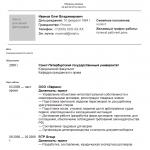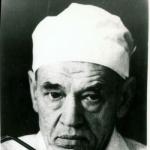Virologist. Who is a Virologist. Description of the profession. Department of Infectology and Virology What does a virologist doctor do
I.M. Sechenov First Moscow State Medical University
Institute of Vocational Education
Head of Department -
Academician of the Russian Academy of Sciences, Professor A.L.Gintsburg
The Department of Infectology was established in 1993 by Academician of the Russian Academy of Medical Sciences S.V. Prozorovsky, who headed it until 1997. Since 2000, the department has been headed by a laureate of the Government of the Russian Federation, Academician of the Russian Academy of Sciences, Doctor of Biological Sciences, Professor Alexander Leonidovich Gintsburg - Director Federal State Budgetary Institution N.F. Gamaleya Research Center for Epidemiology and Microbiology of the Ministry of Health of Russia.
In 2012, by order of the rector of the First Moscow State Medical University named after I.M. Sechenov, by merging with the Department of Virology, it was transformed into the Department of Infectology and Virology.
The teaching staff of the department is represented by well-known specialists of the country in the field of microbiology, virology, epidemiology, genetics and molecular biology of bacteria - professors Yu.M. Romanova and T.A. Semenenko; laureate of the State Prize of the Russian Federation, Professor I.S. Tartakovsky; laureate of the Prize of the Council of Ministers of the USSR and prizes of the Government of the Russian Federation, Academician of the Russian Academy of Sciences F.I. Ershov; laureate of the Prize of the Council of Ministers of the USSR, Professor B.S. Naroditsky; professors A.D. Altstein and A.I. Mazus; associate professors G.A. Danilina, A.E. Snegireva, E.V. Tsyganova and N.M. Shustrova; assistant A.P. Samsonova.
The functioning of the department on the basis of the center and the integration of the country's leading scientific center in the field of medical microbiology into the system of postgraduate professional education allow:
Promptly include the latest scientific achievements in the field of medical microbiology, epidemiology, virology, biotechnology and infectious immunology in the training and retraining program for professional personnel of bacteriologists and virologists,
To use the rich methodological potential of the institute, the results of priority fundamental research in the field of traditional and molecular diagnostics of infectious diseases in the organization of the educational process, conducting practical classes,
Implement scientific methods in the organization of the pedagogical process in the preparation of state educational standards, manuals, teaching aids, methodological materials.
Additional professional education at the department includes:
Professional retraining in the specialty "bacteriology" - 504 hours,
- professional retraining in the specialty "virology" - 504 hours,
"bacteriology" - 144 hours,
- advanced training (certification cycle) in the specialty
"virology" - 144 hours,
- advanced training under the program "Molecular genetic methods in the diagnosis of infectious diseases" for bacteriologists and virologists - 108 hours,
- advanced training under the program "Viral hepatitis" - 72 hours,
- advanced training under the program "HIV-infection" - 72 hours,
- advanced training under the program "Influenza and SARS" - 72 hours.
Form of study on advanced training cycles - full-time . On a budgetary basis and on a contractual basis (extrabudgetary form of education).
We accept specialists with higher medical and pharmaceutical education.
Specialists with a biological education are accepted according to license First Moscow State Medical University named after I.M. Sechenov.
The term of study under the programs of additional professional education in the form professional retraining in the specialty "bacteriology" or "virology" is 504 hours, or 3.5 months. Mastering the professional training program by a specialist is confirmed state final certification. The state final certification involves test control, assessment of the practical skills of a specialist based on the solution of situational problems, the performance of scientific and practical work and a final interview. Upon successful completion of the full training program, the student receives Diploma on professional retraining of the state sample and certificate.
Term of training on cycles general improvement (certification) is 144 hours, or 1 month. After successfully passing the qualifying exam and completing scientific and practical work, the student receives certificate government specialist and certificate about professional development.
Learning on cycles thematic improvement(108 hours) involves the involvement of bacteriologists and virologists. At the end of the course, students who successfully passed the test will receive certificate on advanced training of the state sample.
The topics of lectures and seminars in the cycles include fundamental (“Fundamentals of molecular genetics of bacteria”) and applied (“PCR and other molecular genetic methods in the diagnosis of infectious diseases”, “Principles of organizing a PCR laboratory”) sections.
In recent years, new sections have been introduced into the subject of cycles: "Fundamentals of Biosafety", "Using PCR to Indicate Genetically Modified Microorganisms", "Real-Time PCR", "Using Molecular Genetic Methods in Studying Pathogens Persistence and Biofilm Formation", "Sequencing Methods DNA."
Practical classes are held on the basis of the laboratory of genetic engineering of pathogenic microorganisms. Each student is provided with an individual workplace, where he has the opportunity to practically master the typical PCR setup and perform an individual task on the indication of bacteria and viruses in biological material. Students get acquainted with the latest equipment, meet with representatives of companies that develop equipment and test systems for molecular genetic diagnosis of infectious diseases.
Description:
Man has always sought to understand the laws of nature. He accumulated and systematized the acquired knowledge and applied it for the benefit of society. Such an act became the main criterion of science in the middle of the 19th century. It was then that the Russian scientist D.I. Ivanovsky, in the course of many years of research, proved the existence of the virus. Science has advanced a lot these days. A special doctrine appeared - virology. She studies viruses and has her own classification. So, they distinguish general virology, private and molecular.
The nature of viruses, their structure, decomposition, biochemistry, and genetics are studied by general virology; the study of pathogenic viruses, their infectious properties, the development of measures for the prevention, diagnosis and treatment of diseases caused by them is carried out by medical, veterinary and agricultural virology.
Questions about intercellular transport (movement) of viruses are important. It is important to study the characteristics of proteins that transport different groups of viruses and cellular receptor proteins (as if perceiving viruses), as well as the mechanisms that control and ensure cell resistance to viruses.
Without the achievements of virology, it is no longer possible to imagine, for example, modern medicine, since it is virology that makes it possible to create effective drugs for the prevention and treatment of many viral infections (such as, for example, influenza, herpes, hepatitis). Virology closely interacts with disciplines such as chemistry, biochemistry, and genetics.
Place of work
Specialists can work in research institutes, laboratories. Mostly the place of work is a laboratory - modern, equipped with the latest equipment, which allows the use of various biochemical, biophysical, radiobiological and other methods. The arsenal of virologists includes optical and electron microscopy, computer technology.
They also work in commercial structures. Specialists work both in public hospitals and in private clinics as virologists.
Virologists also work in vivariums, at experimental stations and test sites, and organize special virological expeditions.
Responsibilities:
Virologists can work in two directions:
1 - study molecular biology and genetics, physics and chemistry of macromolecules, i.e. the phenomena of biosynthesis of living matter and the phenomena of heredity.
2 - study medicine and pharmacology and fight diseases by obtaining antiviral vaccines.
General responsibilities:
Conducts laboratory virological studies in accordance with the duties assigned to him.
Ensures the use of analytically and diagnostically reliable methods.
Participates in the development and implementation of new research methods and equipment.
Advises doctors of other specialties on virology issues.
Participates in the interpretation of laboratory test results.
Carries out activities to conduct internal and external quality control of research.
He analyzes his work and the work of specialists subordinate to him with a secondary medical education.
Prepares monthly reports on his work, participates in the preparation of the annual report of the laboratory.
Controls the correctness of carrying out diagnostic procedures, the operation of instruments, apparatus and equipment, the rational use of reagents, the implementation of safety and labor protection rules by middle and junior medical personnel.
Plans its work and analyzes the performance of its activities. Systematically improves his skills.
Requirements:
Personal qualities
A person who connects his life with virology should be inquisitive, interested in the problems of modern science. It is clear that it is important to be conscientious and accurate when conducting both individual experiments and research as a whole. Work can be associated with great mental and physical stress, a specialist must be able to act quickly in difficult conditions, be able to find a way out of impasses, have a flexible mind (viruses are active “without days off” and will not wait for you). You need to be prepared for long, painstaking work that requires high concentration and accuracy. Sometimes the researcher has to work at night, on weekends and on holidays.
It is also necessary to be aware that working with viral material may be associated with a danger to the health and life of not only the experimenter, but also others. Is it necessary to say that a professional virologist must love his work and treat it responsibly?
However, even the presence, the severity of all these qualities is not enough to become a professional virologist. There are some medical contraindications to choosing this profession. Of course, you should not choose this profession for people with allergic reactions to chemicals. Allergy to plant pollen and animal hair is unacceptable (you have to work with these objects). Visually impaired people are also not recommended to work in this area, as constant eye strain is required when working with microscopes and other devices, which is not only difficult for people with poor eyesight, but can lead to its deterioration.
Professional knowledge and skills
The success of the work largely depends on the exact knowledge of the properties and characteristics of the instruments and preparations involved, on the accuracy and thoroughness in the preparation of the experiment (often long and laborious), and on the pedantry in its implementation. The processing of the obtained results is also not easy, their correct interpretation often requires setting up new clarifying experiments and attracting additional information.
In his specialty, a virologist must know the organization of the virological service; the nature and origin of viruses, their structure and basic properties; modern classification of viruses, their reproduction; issues of pathogenesis and antiviral immunity; immunopathology in viral infections; main issues of epidemiology and prevention of viral infections; methods of treatment of viral infections; issues of genetic engineering and biotechnology; characterization, cultivation of various groups of viruses; principles of laboratory diagnosis of viral infections using rapid diagnostic methods, isolation and typing of viruses, serodiagnosis; the main clinical symptoms of viral infections; features of pathogenesis, immunity and epidemiology of viral infections; measures of specific and non-specific prophylaxis, chemotherapy and chemoprophylaxis of viral diseases; questions of sanitary virology.
Education
The specialty of a virologist can be obtained at the Faculty of Biology of the University. A person with a higher medical education who has completed postgraduate training or specialization in the specialty "Virology" is appointed to the position of a virologist.
The activity of a specialist in the field of virology is work with laboratory diagnostics, therapeutic and anti-epidemic measures for viral infections, as well as with the basics of specific prevention. A virologist can use his professional skills in the field of healthcare, education, laboratory diagnostics and pharmacology.
Scope of competence
The demand for the profession of a virologist is currently quite high, as the number of viral diseases is growing at an incredible rate. To date, the most common of them are:
- Herpes;
- Viral hepatitis;
- Rubella;
- Measles;
- smallpox;
- Parotitis;
- Viral papillomas;
- Tick-borne encephalitis;
- Rabies;
- Flu and many other ailments.
Every person who wants to maintain their health should, at the very first symptoms of infectious diseases of viral origin (even with a slight malaise), immediately contact a virologist who will conduct a thorough examination, make the correct diagnosis and prescribe competent treatment. This will help to avoid serious complications of the disease in the future.
People vacationing in exotic countries should also visit a virologist after their vacation, because in tropical areas you can become infected with life-threatening viral ailments that do not begin to manifest themselves immediately. For example, the onset of hemorrhagic fevers is no different from a common flu or cold. And only after a certain period of time, a hemorrhagic symptom (bleeding) joins, which leads to death. So, any traveler who has visited an exotic country should also resort to the advice of an experienced virologist who can make an accurate diagnosis even at the earliest stages of the disease.
What are the symptoms to see a specialist
Very often, when symptoms of a viral disease occur, patients delay visiting a virologist, which then can negatively affect not only human health, but also lead to death. You should see a virologist if you experience any of the following symptoms:
- Fever.
- Severe headache.
- Rashes on the skin and mucous membranes of a different nature.
- Gastrointestinal disorders.
- Dry mouth.
- Jaundice of the sclera and skin.
- Pain in the region of the lymph nodes.
- Insomnia.
- Excessive excitement or depression.
- Severe muscle or radicular pain.
During the appointment, the doctor collects a history (anamnesis) of the life and development of the disease, conducts a thorough examination of the patient and prescribes the necessary tests to the patient (including virological research methods). After the diagnosis is established, the virologist prescribes effective drug treatment and diet therapy to the person who has applied to him.
RUB 35,000–45,000 (worka.yandex.ru)
Place of work
Virologists work in laboratories, institutes, educational and medical institutions, research centers.
Responsibilities
First of all, a virologist is engaged in virological research. At the same time monitors the quality of the study drug, the conditions of its delivery and storage. The virologist may also take part in the introduction of new equipment and its maintenance in working condition.
In a medical institution, a virologist consults doctors, helps in interpreting laboratory results, and recommends diagnostic procedures.
Important qualities
In the profession, such qualities are important as: a tendency to monotonous research work, love for biology, accuracy, attentiveness, perseverance and good health.
Reviews about the profession
According to reputable virologists, the profession is now more relevant than ever. Every day there are new viruses that can harm a small group and people, and the whole community. Specialists work every day to identify new types of viruses and try to find means to combat them.
stereotypes, humor
“Songs with the words “Bird of happiness of tomorrow” and “Migratory birds are flying” are especially popular among Chinese virologists who intensively study the Russian language.
Education
To become a virologist, you need to get a specialized higher education, for example, at the Leningrad State University named after A. S. Pushkin.
Medical universities in Moscow: Moscow State University. Lomonosov, First Moscow State Medical University named after I.M. Sechenov, Russian National Research Medical University N.I. Pirogov Russian National Research Medical University.
Beginning: 11000 per month

Experienced: 20000 per month

Professional: 34000 per month
Demand for the profession
According to reputable virologists, the profession is now more relevant than ever. Every day there are new viruses that can harm a small group and people, and the whole community. Specialists work every day to identify new types of viruses and try to find means to combat them.
Where to study as a Virologist in Moscow
Who is the profession for?
In the profession, such qualities are important as: a tendency to monotonous research work, love for biology, accuracy, attentiveness, perseverance and good health.
Career
Career growth depends on the place of work of a specialist and is manifested mainly in an increase in wages. There is also the possibility of promotion along the administrative line, in the research field.
Responsibilities
- Conducts laboratory virological studies in accordance with the duties assigned to him.
- Ensures the use of analytically and diagnostically reliable methods.
- Participates in the development and implementation of new research methods and equipment.
- Advises doctors of other specialties on virology issues.
- Makes recommendations on the rules for taking and delivering biological material to the virological laboratory.
- Participates in the interpretation of laboratory test results.
- Carries out activities to conduct internal and external quality control of research.
- He analyzes his work and the work of specialists subordinate to him with a secondary medical education.
- Prepares monthly reports on his work, participates in the preparation of the annual report of the laboratory.
- Controls the correctness of carrying out diagnostic procedures, the operation of instruments, apparatus and equipment, the rational use of reagents, the implementation of safety and labor protection rules by middle and junior medical personnel.
- Plans its work and analyzes the performance of its activities. Systematically improves his skills.





